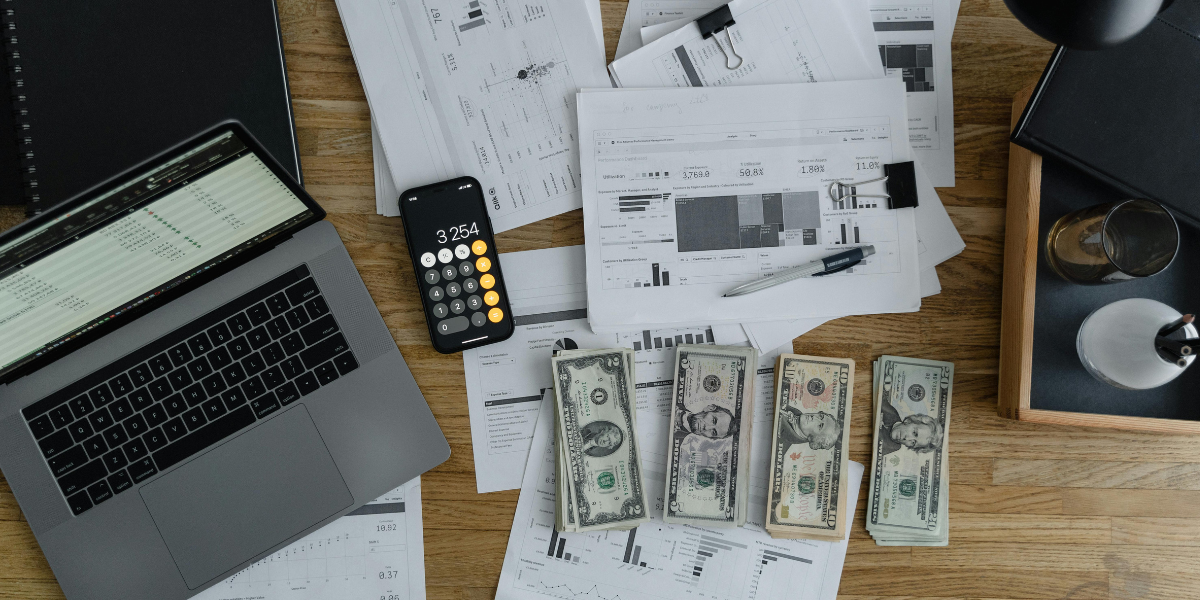.jpg)
Equipment Financing: Pro Tips, Golden Rules and Tax Benefits
In the intricate world of business operations, acquiring the right equipment can be a make-or-break moment. The machinery, technology, and tools a company uses are often the lifeblood of its success. However, the steep upfront costs of equipment purchases can present a significant hurdle for businesses, particularly for startups and small enterprises. This is where equipment financing comes to the rescue, offering a lifeline that allows businesses to acquire essential assets without depleting their cash reserves.
We'll dissect the inner workings of equipment financing, shedding light on its benefits, key takeaways, expert tips, and answering frequently asked questions to help you navigate this vital aspect of business finance.
Understanding Equipment Financing: The Basics
Equipment financing is a form of business funding specifically designed for the acquisition of equipment, machinery, vehicles, or technology. Unlike traditional loans that may require collateral in the form of real estate or general business assets, equipment financing uses the equipment being purchased as collateral. This arrangement minimizes the lender's risk, making it an attractive financing option for businesses.

The Benefits of Equipment Financing
Preserve Capital
Equipment financing allows businesses to acquire necessary assets without depleting their cash reserves, ensuring liquidity for day-to-day operations, emergencies, and unforeseen opportunities.
Tax Benefits
Depending on your location and the specific financing structure, you may be eligible for tax benefits, such as depreciation deductions and interest deductions.
Flexible Terms
Equipment financing offers flexibility in terms of repayment options, making it easier to match your payments to your cash flow.
Quick Access
The application and approval process for equipment financing is typically faster and less cumbersome than traditional loans, enabling businesses to acquire equipment promptly.
Key Takeaways for Business Owners
Choose the Right Type
Equipment financing comes in various forms, including equipment loans, equipment leases, and equipment lines of credit. Carefully consider which option aligns best with your business needs and financial goals.
Assess Your Equipment Needs
Conduct a thorough assessment of your equipment requirements to determine precisely what you need. Avoid overextending your financing for items that don't directly contribute to your business's growth.
Understand the Terms
Familiarize yourself with the terms of the financing agreement, including interest rates, repayment schedules, and potential fees. Negotiate for terms that align with your financial capabilities.
Review Tax Implications
Consult with a tax professional to understand the tax implications of your equipment financing arrangement. This can help you maximize the benefits while remaining compliant with tax regulations.
Expert Tips for Successful Equipment Financing
Improve Your Credit
A strong credit profile can lead to better financing terms. Work on improving your personal and business credit scores before applying for equipment financing.
Prepare Documentation
Gather all necessary financial documents in advance to expedite the application process. This includes tax returns, financial statements, equipment quotes, and bank statements.
Shop Around
Don't settle for the first financing option that comes your way. Explore multiple lenders and compare terms and rates to secure the most favorable deal.
Evaluate Total Costs
Consider the total cost of ownership, including interest and fees, when evaluating equipment financing offers. Sometimes a lower interest rate may not be the most cost-effective option in the long run.

Equipment Financing vs. Equipment Leasing: Making the Right Choice for Your Business
In the world of business, having the right equipment can be a game-changer. Whether you're running a manufacturing facility, a tech startup, or a restaurant, the need for specialized machinery, technology, or tools is often a given. But the question that arises is, how do you acquire these essential assets without draining your capital? Two popular options are equipment financing and equipment leasing. While they share similarities, they have distinct differences that can significantly impact your business's financial strategy.
Let's delve into the nuances of equipment financing and equipment leasing to help you make an informed decision that aligns with your business's needs and goals.
What is Equipment Leasing?
Equipment leasing allows businesses to use equipment without owning it. Instead, you make regular lease payments to the lessor (the equipment owner) for the use of the equipment for a specified period.
Key Features of Equipment Leasing
Flexibility
Leasing offers flexibility, allowing businesses to acquire and use equipment without a substantial upfront cost. This can be particularly advantageous for startups or businesses with limited capital.
Upgrade Options
Leasing often provides the opportunity to upgrade to newer equipment at the end of the lease term, keeping your business technologically up-to-date.
Lower Initial Costs
Typically, leasing requires a lower initial down payment compared to financing or purchasing equipment.
Maintenance and Support
Some lease agreements include maintenance and support services, reducing the burden on your business.
When to Choose Equipment Leasing
- If you require equipment for a specific project or short-term use.
- If you prefer to avoid the responsibilities of equipment ownership, such as maintenance and potential depreciation.
- If you want the flexibility to upgrade to newer equipment as technology advances.
Comparing the Two: Making the Right Choice
The decision between equipment financing and equipment leasing ultimately depends on your business's unique circumstances, financial goals, and equipment needs. Consider the following factors:
Financial Situation
Assess your current financial situation. If you have ample capital and want to own the equipment, financing might be the better choice. If you prefer to preserve capital or need flexibility, leasing could be more suitable.
Equipment Lifespan
Consider the expected lifespan of the equipment. If it's a long-term investment, financing may make more sense. For shorter-term needs or rapidly evolving technology, leasing is a practical option.
Tax Implications
Consult with a tax professional to understand the tax implications of both financing and leasing in your specific circumstances. Tax benefits can significantly impact your decision.
Business Goals
Align your choice with your business goals. Do you prioritize ownership, or is flexibility and regular equipment updates more important?
Maintenance and Support
Evaluate whether you prefer to handle equipment maintenance and support or if you'd rather have these responsibilities covered by the lessor.
Overall Costs
Consider the total costs over the equipment's lifecycle, including interest, lease payments, maintenance, and potential depreciation. Compare these costs for both financing and leasing options.

Frequently Asked Questions (FAQs) About Equipment Financing
What types of equipment can be financed?
Equipment financing can be used for a wide range of assets, including machinery, vehicles, technology, medical equipment, construction equipment, and more.
Can startups qualify for equipment financing?
Yes, some lenders offer equipment financing options tailored to startups. While approval may be more challenging, it's not impossible.
What happens if I can't make a payment on my equipment loan or lease?
Communication is key. If you're facing financial difficulties, contact your lender to discuss potential solutions, such as loan restructuring or lease modifications.
How does equipment financing affect my business's credit?
Equipment financing can positively impact your business's credit if you make timely payments. However, defaults or late payments can have adverse effects on your credit profile.
Are there tax benefits associated with equipment leasing?
In some cases, businesses can deduct lease payments as operating expenses, providing potential tax benefits. Consult with a tax professional for specific guidance.
In the ever-evolving world of business finance, equipment financing remains a powerful tool for entrepreneurs. By understanding its mechanics, benefits, and best practices, businesses can acquire the equipment they need while maintaining financial stability and flexibility. Whether you're a startup or a seasoned enterprise, equipment financing can be the key to unlocking your growth potential.
How to Take Advantage of Equipment Financing Tax Benefits
Depreciation Deductions
One of the primary tax benefits of equipment financing is the ability to claim depreciation deductions. When you purchase equipment outright, you typically can't deduct the full cost in the year of purchase. Instead, you must spread out the deduction over several years, following the rules of depreciation.
However, with equipment financing, you can often deduct the full cost of the equipment in the year it was placed in service, thanks to provisions like the Section 179 deduction and Bonus Depreciation. These provisions are designed to encourage businesses to invest in capital assets, such as equipment, by allowing them to accelerate depreciation deductions. This can significantly reduce your taxable income for the year, resulting in lower tax liability.
Conservation of Working Capital
By opting for equipment financing, you can conserve your working capital, which can be used for other operational expenses or investments. This financial strategy helps ensure you have sufficient liquidity for day-to-day business needs, emergencies, and opportunities, while still enjoying the benefits of top-quality equipment. Essentially, you're using pre-tax dollars to acquire assets, making equipment financing an efficient way to bolster your business's financial health.
Interest Deductions
In some cases, the interest paid on equipment loans or leases can be tax-deductible. This can further reduce your overall tax liability, making equipment financing even more attractive from a financial standpoint. It's essential to consult with a tax professional to understand the specific tax implications of your equipment financing arrangement, as the deductibility of interest can vary based on factors such as the type of financing and the tax laws in your jurisdiction.
Flexible Structuring for Tax Benefits
Equipment financing offers flexibility in how you structure your financing agreement. Depending on your business's financial situation and tax planning goals, you can tailor your equipment financing arrangement to maximize tax benefits. For instance, you may choose to structure a lease with a purchase option at the end, which can provide the advantages of both leasing and ownership while optimizing tax benefits.
State-Specific Incentives
In addition to federal tax benefits, many states offer their own incentives and tax breaks for equipment purchases. These can include sales tax exemptions, property tax incentives, or credits for investing in certain types of equipment. These state-specific incentives can further enhance the tax advantages of equipment financing, but it's crucial to research and understand the incentives available in your particular state.
Equipment Loans: Explained
Equipment financing not only helps businesses acquire essential assets but also offers substantial tax benefits that can positively impact your bottom line. By efficiently managing your equipment financing and collaborating with tax professionals who understand the nuances of tax laws, you can harness these advantages to enhance your business's financial stability and growth prospects. Remember that tax laws are subject to change, so it's essential to stay informed about the latest regulations and consult with experts to make the most of the tax benefits associated with equipment financing.






